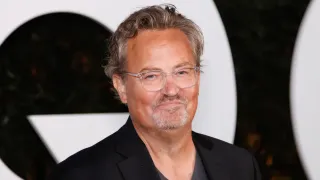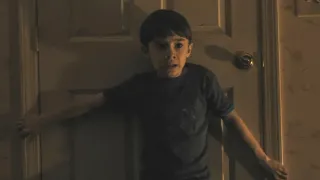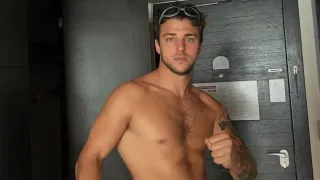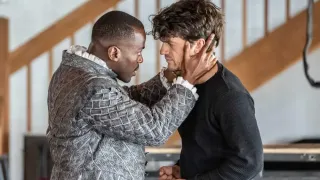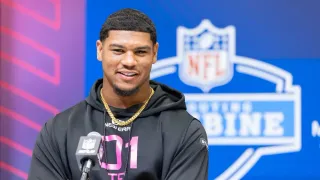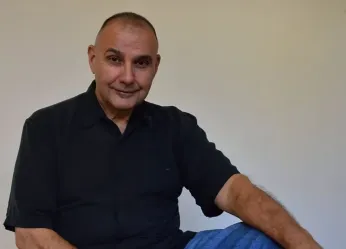
2 hours ago
Voicing the Visual: Rob Urbinati on Bridging Theatre and Accessibility
Nicholas Dussault READ TIME: 7 MIN.
Rob Urbinati is a freelance playwright and the Director of New Play Development at the Queens Theatre in Flushing Meadows Corona Park, Queens, NY. As part of his job he was afforded the opportunity to learn a new skill that was both enriching to him and beneficial to a segment of the population that can sometimes be overlooked or underserved at live performances. Once he became adept at audio description Rob found a new career that melded quite well with his work at the Theatre, while also providing a much-needed service for the blind and low vision population. Recently EDGE had the chance to speak with Rob about his important work doing audio description for a variety of performance genres and venues.
EDGE: Explain what audio description is.
Rob: Audio description is an accessibility service theaters provide for people with disabilities. Other services include ASL (American Sign Language), open captioning and lesser well-known things like sensory friendly performance and touch tours.
The more well-known services like ASL and open captioning can be seen by audiences, whereas audio description, whether recorded or live, is listened to in an earbud by blind or low vision patrons. Nobody knows this is happening except for the patron and, if live, the person doing it live in the tech booth.
EDGE: How did you get involved in it?
Rob: I work at Queens Theatre and they asked me if I wanted to do the training. I thought it sounded interesting and fun; it was something new and it does tie into writing. As a playwright you want to pick the perfect word, the most specific, precise word. I would go back to the theatre and audio describe everything we do, concerts, plays, galas, children’s shows, dance programming. Even if the theater wasn’t offering audio description for a performance I would do it as a rehearsal as if I was going to have people listening to it. I did it so much that I got really good at it. Queens Theatre is very much at the vanguard of services for the disability community. We do a lot of plays by disabled writers, cast authentically with disabled actors. We even have a disabled actor training program. People were coming there anyway and they were listening to my audio description. I started to get offers right away. Big offers like Broadway shows and MoMA (Museum of Modern Art).
EDGE: What is it that you are describing?
Rob: I describe the visual elements of whatever I’m seeing. It can be a play, a movie, a dance program, anything really. I try to conjure up, in as few words possible, the most precise, concise visual representation of the show. Ultimately, it’s still going to be an aural experience for them but I can supplement that experience with descriptions of what the set and costumes look like, any particular blocking of the show, significant props. And I have to do it in as few words as possible.
EDGE: What’s the difference between live and recorded audio description?
Rob: Obviously with film and television, it’s all recorded. Somebody writes an audio description cue. If you watch something on Netflix, go to settings and put on the open captioning. There will be an audio description function. Turn it on and you’ll hear somebody telling you, in between and around the dialogue, what’s happening visually.
When I do it live, I have access to the script. I'll read it a couple of times, take some notes and go see the show a couple more times to get more notes. I have to be very specific about visual elements, blocking and anything else I can't get from the script. I will go into a tech booth while the show is being performed and describe the visual elements of the show for the patrons listening in an earbud. It’s different than assisted listening headphones because the patrons only use one earbud so they can hear the show out of the other ear.
EDGE: Is it more difficult to do the audio description live?
Rob: The challenge with doing it live is that when the play is going on, you have to be looking at it. You can't read from notes. I can have little cheat sheets with characters names if there's a lot of characters, but basically I have to just stare at the stage. Again, I’ve seen it, I’m familiar with the script. So I just describe what I’m seeing, like, “John hurries into the room and throws a pile of clothes on the couch.” But I have to make sure it’s not too long so it could be “John hurries into the room and throws clothes.” It’s important that I make it fit so they hear all of the dialogue.
EDGE: Does this happen at every performance?
Rob: What used to happen was there would be designated live audio described performances. If you wanted to see Hamilton you would look on the website or go to the box office and find out when the performance would be audio described. But the challenge was that if you're blind or low vision you had to go on one of those nights. But the Schubert Organization has now funded recorded audio description for all Broadway shows, not just for Schubert houses.
EDGE: Is live better than recorded?
Rob: Live audio description is better in case an understudy goes on or something a little different happens, but recorded works for Broadway shows. We wait until the show opens so that we are sure it’s the final show that we’re describing. Right after the show opens I’ll read the script, see the show a couple of times and take notes into voice memo. It’s a function on iPhone that picks up the whole show without any effort. I can describe all of the visual elements and the blocking to myself. I can make notes like “A gold curtain comes in; it’s hit with red lights. The curtain lifts and Rose runs onto the set.” (Gypsy) When I get home I have the voice memo and I can turn it on and hear everything I said and every single word that was spoken on stage. I can also know where the spaces are; where I have time to pop in some audio description.
EDGE: Are you talking into your phone during the actual show?
Rob: Yeah, that's an interesting thing because I go to see the show at least twice. The first time I don't do voice memo. I just have a steno pad and take notes because I want to experience the show more fully. And then, yes, the second time, we have to ask the house managers to get us a seat where there aren't a lot of people. This can be a challenge. Sometimes they're just not helpful. I've had to stand at the back, been put with a monitor somewhere or, sometimes, just sat with a tech person. There’s tons of tech going on at Broadway shows, they might say just sit with this person.
EDGE: When do you record the actual audio description?
Rob: After I listen to the voice memo I write out what's called a cue sheet. Cue number one, lights focus on the conductor, cue number two, curtain rises. When that’s done I go to a recording studio in Midtown and record all the cues. On Broadway it's going right into somebody's ear so they want it to sound casual and conversational. When they’re all recorded and then brushed up by the engineer to make sure they sound really good, I have to go back to the theater and send the cues. I sit at a laptop and make sure that they are as close to when I want them to happen as possible. They’re all tied into light cues on Broadway and there are many light cues in every show. Sometimes they don’t exactly land where you want them to, and that’s why live is better. But when they’re recorded, anybody, anytime who is blind to low vision wants a description they just pick up the earbud at what’s called the cabinet.
EDGE: You mentioned doing audio description for other performances. How would you describe dance?
Rob: I hadn't heard that much audio description for dance when I started to do it myself, but then I would go to a Broadway show that had a lot of dance in it and listen to the audio description and hear how it was done. I didn't like it. You would never say plie or jete because you can’t assume the blind or low vision person has access to that terminology. You can try to describe what a move looks like, but you can’t keep doing that over and over in a piece that is 3 or 4 minutes long. I'd rather describe the dance like this, ‘It consists of enthusiastic leaps, twirls and jumps or a sensual series of moves where the dancers are seemingly dragging themselves across the stage.”
EDGE: What do you say when somebody is tapping?
Rob: They’re tapping faster, doing things in unison, or doing individual moves. Dance poses certain challenges because there’s only so much variety I can put into the descriptions. “She’s kicking above her head, somebody else is kicking above their head. It’s joyous, exuberant, sensual, sexual.” The easier thing about it is that you don’t have to worry about stepping on the dialogue so you can just yap away.
EDGE: You’ve done silent movies?
Rob: I just did it at MoMA. I did Buster Keaton and Charlie Chaplin. The movies are short so, like dance, you can talk all the time. But every single thing they do is either a joke or a setup for a joke. “He puts the rake down; he steps on the rake and it hits him in the face.” I couldn’t take my eyes off the screen for one second and I didn’t stop talking. The characters don’t have names so they’re “the girl, hobo one, hobo two.” It was a really fun challenge. I enjoyed it. MoMA gets a big turnout for this series. In this particular one there were 27 blind and low vision people listening to the silent movies. I talked to many of them after and they said it was great, though one of them said I sound like Woody Allen. I don’t think I sound like him at all. Maybe it’s my Framingham (MA) accent.
EDGE: How would someone interested in this as a career go about it?
Rob: I would suggest they watch some TV programs or movies that are audio described to get a sense for what it’s like. Joel Snyder offers a week-long training every year through the American Council of the Blind. He’s brilliant, the best audio describer I’ve ever heard. He’s also written a book The Visual Made Verbal that covers pretty much everything that’s in the workshop. But the hardest part once you are trained is finding a job. You might benefit from shadowing someone who is currently doing it.
https://www.roburbinati.com/

